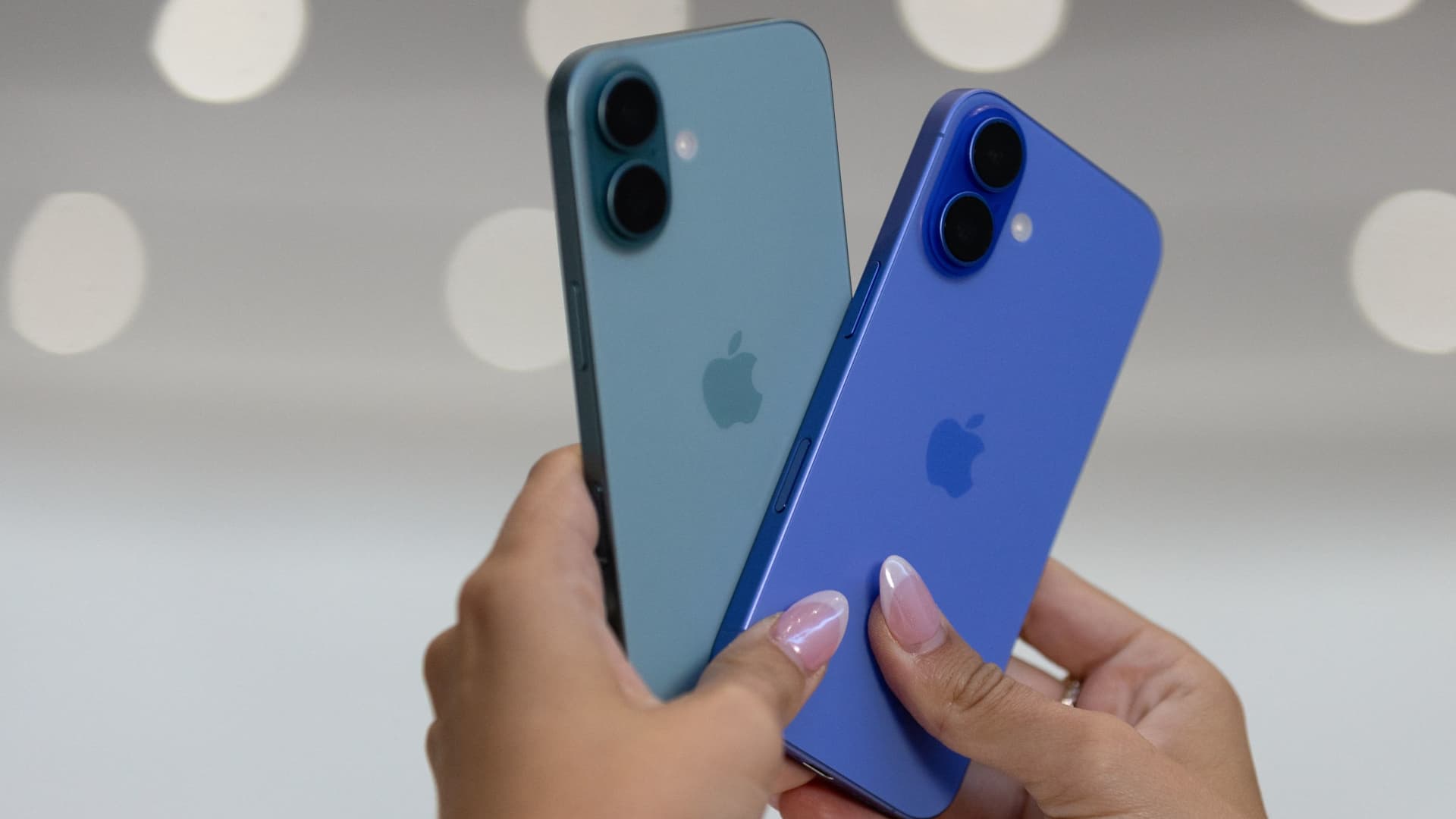
An attendee holds two iPhones 16 as Apple holds an event at the Steve Jobs Theater on its campus in Cupertino, California, U.S. September 9, 2024.
Manuel Orbegozo | Reuters
Apple shares slid 3.6% in Monday morning trading, after reports that demand for the new iPhone 16 is lower than expected — and down 12% year over year from the first-weekend sales of the iPhone 15 last year, TF Securities analyst Ming-Chi Kuo wrote in a note.
“The key factor is the lower-than-expected demand for the iPhone 16 Pro series,” Kuo wrote after compiling data from Apple’s websites on each iPhone 16 model’s pre-order sales, average delivery times and shipments before pre-order.
Kuo added that one of the “key factors” of lower demand is that the “major selling point, Apple Intelligence, is not available at launch alongside the iPhone 16 release. Additionally, intense competition in the Chinese market continues to impact iPhone demand.”
Last Monday, Apple unveiled new versions of the iPhone, AirPods and Apple Watch at an event at its headquarters in Cupertino, California. Pre-orders for the new iPhones began Friday and launch on Sept. 20, but the first Apple Intelligence features for iPhone 16 won’t launch until next month, in a beta version.
Analysts at Barclays, JPMorgan and Bank of America also wrote in investor notes that shipping times could translate to lighter demand for the newest iPhone Pro models, compared to last year.
“Based on our conversations with distributors and analysis of pre-order figures on major Chinese e-commerce sites, total pre-order units were down Y/Y within the first couple of days, with a lower pro model mix,” Barclays analysts wrote in a note. “We heard that pro model units were down double digits on a Y/Y basis, while base and plus models grew Y/Y.”
The Barclays analysts added that the rollout of Apple Intelligence in the Chinese language “is not until CY2025, which may dampen early enthusiasm for IP16. Weak macro and competition continue to weigh on iPhone sales in China.” They also wrote that Apple had to rely on significant discounts to help China sales for the iPhone 15.
When tracking key markets’ delivery lead times as a demand indicator, the JPMorgan analysts wrote that “early lead-times are indicating demand on the iPhone 16 base models in-line to the iPhone 15 series during Week 1 (e.g., Pre-Order Week), while early demand indicators for Pro models are starting off modestly softer relative to the iPhone 15 series.”
BofA analysts wrote that after tracking iPhone ship dates on Apple’s own website, and various carrier websites, ship time “for the iPhone 16 Pro and Pro Max models are extended, but somewhat less (on
average) compared to last year at this point in the pre-order cycle.”
They added that “though the extension of ship dates can be reflective of iPhone demand, other factors
such as supply, inventory, allocation and pricing could be impacting the ship dates.” The analysts also wrote that Apple reduced iPhone 16 prices in Australia and India.
The iPhone 16 Pro and the iPhone 16 Pro Max are Apple’s more premium phones that have nicer screens and cameras than the regular models, starting at $999 and $1,199, respectively.
The Pro models have the “thinnest borders on any Apple product,” Apple said at its event last week, calling them “by far our best iPhone displays ever.” The titanium is nearly half the weight of stainless steel and is “more scratch resistant than other forms of titanium others have used.”
The company also said during the event the new iPhone 16 Pro Max has “the best iPhone battery life ever” but did not offer additional details.
— CNBC’s Michael Bloom contributed reporting.